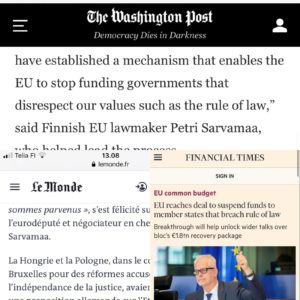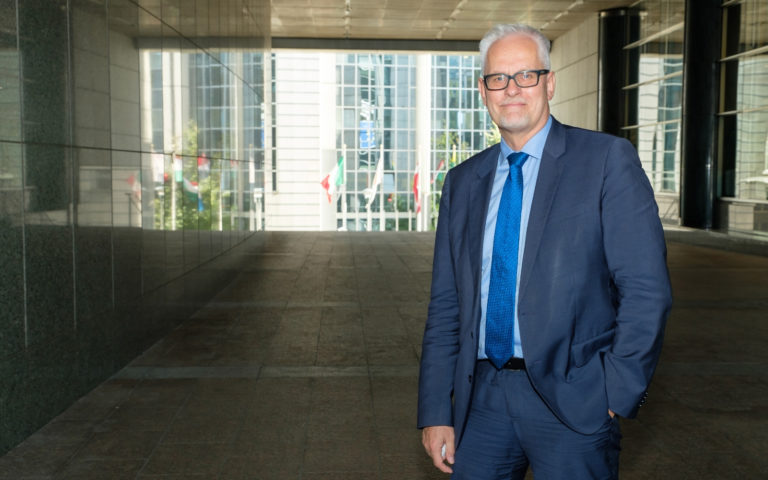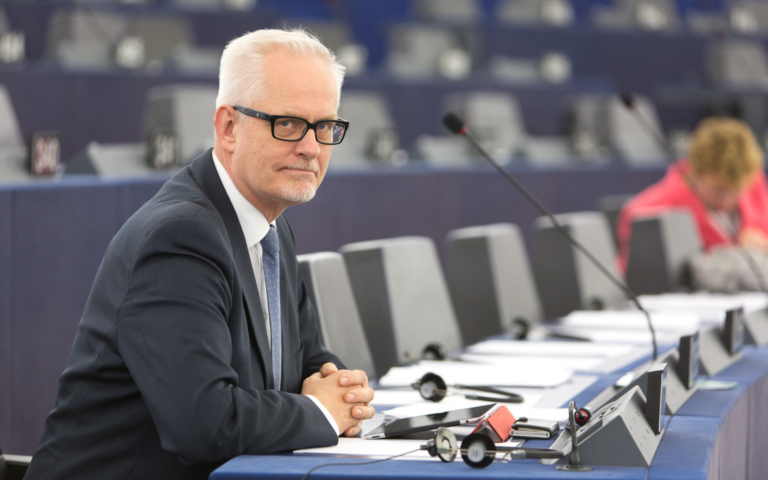Neuvottelemani oikeusvaltiosopu noteerattiin laajasti maailmalla

Oikeuvaltiosovusta uutisoitiin laajasti eri medioissa. Löydät ne koottuna tästä artikkelista
Financial Times:
EU reaches deal to suspend funds to member states that breach rule of law
Breakthrough will help unlock wider talks over bloc’s €1.8tn recovery package
EU negotiators have reached an agreement on rules to suspend budget money to member states that breach fundamental rights, a breakthrough that will help unlock wider talks over the bloc’s €1.8tn recovery package.
Negotiators from the European Parliament and EU ambassadors on Thursday struck a preliminary deal on the bloc’s first rule-of-law mechanism which will tie budget money to respect for EU values, including the independence of judges.
The hard-fought negotiations over the mechanism — first proposed by Brussels in 2018 — have split EU member states and pitted them against MEPs. Poland and Hungary — which are already the target of longstanding inconclusive EU rule-of-law disciplinary proceedings — have threatened to veto the EU’s entire upcoming budget deal if it includes a tool which they argue targets them. The agreement is subject to final approval from a majority of member states.
Judit Varga, Hungary’s justice minister, accused the European Parliament of making a “reckless and mistaken move” by pushing for a stronger mechanism. “There is no agreement on any element of the EU budget until all its elements have been agreed”, she wrote on Facebook on Thursday.
The European Parliament hailed the agreement as a “historic moment” that responds to the slide towards authoritarianism in some member states. Dacian Ciolos, leader of the centrist Renew Europe group, said it was a “major achievement . . . Europe is not a cash machine”, he wrote on Twitter.
In a victory for the parliament, Petri Sarvamaa, the lead MEP in the talks, said the mechanism would define “breaches” of the rule of law in a way that would allow it to target broader violations of EU values and not just those that had a direct financial impact on the budget. MEPs also received backing from a group of northern member states including the Netherlands, Nordics, Austria and Baltics.
“The EU will not only be able to stop EU funding once the rule-of-law principles have already been breached, but also in cases where it is evident that recent governmental decisions represent a future risk for EU finances,” said Mr Sarvamaa. “For example, when the independence of national courts is undermined, there is a clear risk that judges may take arbitrary decisions or disregard cases of corruption and fraud.”
The tool gives the European Commission the power to identify breaches of the rule of law in member states and to propose a suspension or reduction of budget money. This decision would then need to be approved by a majority of EU governments, which would hold a vote within one month.
The rule-of-law tussle has threatened to derail a huge financial package agreed by EU leaders in July, the need for which has become more pressing as Europe’s economy has been forced into fresh hibernation with new lockdown measures imposed in many countries this month.
Member states and the parliament are still haggling over the exact size of the upcoming seven-year EU budget and Covid-19 recovery plan, with the parliament demanding additional money worth more than €30bn.
Johannes Hahn, the EU’s budget commissioner, called Thursday’s agreement a breakthrough that he hoped would trigger “additional dynamics” in the talks over the final size of the multiannual budget.
MEPs are due to meet officials and the German presidency on Monday with the hope of bringing the complex and drawn-out negotiations to a close. Mr Hahn told the Financial Times that a deal on the matter was “achievable” as soon as Monday. “The dinner is prepared, if you like,” he said.
Having reached an agreement on the rule of law, Michael Clauss, Germany’s EU ambassador and head of the negotiations for the Council of Ministers, urged MEPs to come to an agreement on the recovery deal. “We have a historic €1.8tn financial package on the table. With the second wave of the pandemic hitting member states hard, there is no time to lose,” he said.
(Alkuperäinen julkaisu löytyy täältä)
Washington Post:
EU negotiators clinch deal tying rule of law to fund access
BRUSSELS — European Union negotiators clinched an agreement Thursday that would impose sanctions on EU countries that fail to live up to the bloc’s democratic standards. The deal could help unlock hundreds of billions of euros in emergency coronavirus support by the start of the year.
Hungary and Poland are mired in EU proceedings over concerns that their right-wing populist governments are violating European standards with laws and practices that threaten the independence of judges and the rights of journalists.
The two countries, whose economies have benefited significantly from EU funds since they joined the bloc in 2004, have vehemently opposed any attempt to condition their access to that money to the way their governments apply the rule of law.
But under the lead of Germany, which holds the EU’s rotating presidency, negotiations with the European Parliament have “reached a provisional agreement on a new general regime of conditionality to protect the Union budget.”
The sanction deal would be evoked when “breaches of the principles of the rule of law in a member state affect or seriously risk affecting the sound financial management of the EU budget or the protection of the financial interests of the EU.”
“Today’s agreement is a milestone for protecting EU values. For the first time, we have established a mechanism that enables the EU to stop funding governments that disrespect our values such as the rule of law,” said Finnish EU lawmaker Petri Sarvamaa, who helped lead the process.
Greens negotiator Daniel Freund said “the rule of law in Europe is in a deep crisis. The current developments in Poland and Hungary show this in a depressing way. We must now react decisively — also with sanctions against member states. The value of this mechanism will be measured by how quickly it can be implemented.”
Under the procedure, the European Commission would establish whether any fundamental principles have been violated and then propose to trigger the sanctions. The commission, the EU’s executive arm, is responsible for proposing bloc-wide laws and ensuring that they are respected.
EU countries would then have one month — or three months in exceptional circumstances — to adopt the measures proposed by the commission by a “qualified majority” vote, which means at least 15 of the bloc’s 27 nations representing at least 65% of the bloc’s 450 million people.
A country being targeted could defend itself before the commission and request a debate among EU leaders to argue its case. Should its access to funds be reduced or cut altogether, the country would still be obliged to pay its EU dues.
The agreement, which must still be officially endorsed by the bloc’s 27 nations and the full EU parliament, is expected to help end a deadlock over the bloc’s next seven-year budget and a massive coronavirus recovery plan, all worth a total of around 1.8 trillion euros ($2.1 trillion). The budget is meant to take effect on Jan. 1.
Germany’s EU envoy, Michael Clauss, described Thursday’s deal as “an important milestone.”
“It is time now to find agreement on the rest of the package as well. We have a historic 1.8-trillion-euro financial package on the table. With the second wave of the pandemic hitting member states hard, there is no time to lose,” he said.
(Alkuperäinen julkaisu löytyy täältä)
Associated Press
EU negotiators clinch deal tying rule of law to fund access
BRUSSELS (AP) — European Union negotiators clinched an agreement Thursday that would impose sanctions on EU countries that fail to live up to the bloc’s democratic standards. The deal could help unlock hundreds of billions of euros in emergency coronavirus support by the start of the year.
Hungary and Poland are mired in EU proceedings over concerns that their right-wing populist governments are violating European standards with laws and practices that threaten the independence of judges and the rights of journalists.
The two countries, whose economies have benefited significantly from EU funds since they joined the bloc in 2004, have vehemently opposed any attempt to condition their access to that money to the way their governments apply the rule of law.
But under the lead of Germany, which holds the EU’s rotating presidency, negotiations with the European Parliament have “reached a provisional agreement on a new general regime of conditionality to protect the Union budget.”
The sanction deal would be evoked when “breaches of the principles of the rule of law in a member state affect or seriously risk affecting the sound financial management of the EU budget or the protection of the financial interests of the EU.”
“Today’s agreement is a milestone for protecting EU values. For the first time, we have established a mechanism that enables the EU to stop funding governments that disrespect our values such as the rule of law,” said Finnish EU lawmaker Petri Sarvamaa, who helped lead the process.
Greens negotiator Daniel Freund said “the rule of law in Europe is in a deep crisis. The current developments in Poland and Hungary show this in a depressing way. We must now react decisively — also with sanctions against member states. The value of this mechanism will be measured by how quickly it can be implemented.”
Under the procedure, the European Commission would establish whether any fundamental principles have been violated and then propose to trigger the sanctions. The commission, the EU’s executive arm, is responsible for proposing bloc-wide laws and ensuring that they are respected.
EU countries would then have one month — or three months in exceptional circumstances — to adopt the measures proposed by the commission by a “qualified majority” vote, which means at least 15 of the bloc’s 27 nations representing at least 65% of the bloc’s 450 million people.
A country being targeted could defend itself before the commission and request a debate among EU leaders to argue its case. Should its access to funds be reduced or cut altogether, the country would still be obliged to pay its EU dues.
The agreement, which must still be officially endorsed by the bloc’s 27 nations and the full EU parliament, is expected to help end a deadlock over the bloc’s next seven-year budget and a massive coronavirus recovery plan, all worth a total of around 1.8 trillion euros ($2.1 trillion). The budget is meant to take effect on Jan. 1.
Germany’s EU envoy, Michael Clauss, described Thursday’s deal as “an important milestone.”
“It is time now to find agreement on the rest of the package as well. We have a historic 1.8-trillion-euro financial package on the table. With the second wave of the pandemic hitting member states hard, there is no time to lose,” he said.
(Alkuperäinen julkaisu löytyy täältä)
Bloomberg
EU Clears Key Hurdle for 1.8 Trillion-Euro Spending Package
BRUSSELS (AP) — European Union negotiators clinched an agreement Thursday that would impose sanctions on EU countries that fail to live up to the bloc’s democratic standards. The deal could help unlock hundreds of billions of euros in emergency coronavirus support by the start of the year.
Hungary and Poland are mired in EU proceedings over concerns that their right-wing populist governments are violating European standards with laws and practices that threaten the independence of judges and the rights of journalists.
The two countries, whose economies have benefited significantly from EU funds since they joined the bloc in 2004, have vehemently opposed any attempt to condition their access to that money to the way their governments apply the rule of law.
But under the lead of Germany, which holds the EU’s rotating presidency, negotiations with the European Parliament have “reached a provisional agreement on a new general regime of conditionality to protect the Union budget.”
The sanction deal would be evoked when “breaches of the principles of the rule of law in a member state affect or seriously risk affecting the sound financial management of the EU budget or the protection of the financial interests of the EU.”
“Today’s agreement is a milestone for protecting EU values. For the first time, we have established a mechanism that enables the EU to stop funding governments that disrespect our values such as the rule of law,” said Finnish EU lawmaker Petri Sarvamaa, who helped lead the process.
Greens negotiator Daniel Freund said “the rule of law in Europe is in a deep crisis. The current developments in Poland and Hungary show this in a depressing way. We must now react decisively — also with sanctions against member states. The value of this mechanism will be measured by how quickly it can be implemented.”
Under the procedure, the European Commission would establish whether any fundamental principles have been violated and then propose to trigger the sanctions. The commission, the EU’s executive arm, is responsible for proposing bloc-wide laws and ensuring that they are respected.
EU countries would then have one month — or three months in exceptional circumstances — to adopt the measures proposed by the commission by a “qualified majority” vote, which means at least 15 of the bloc’s 27 nations representing at least 65% of the bloc’s 450 million people.
A country being targeted could defend itself before the commission and request a debate among EU leaders to argue its case. Should its access to funds be reduced or cut altogether, the country would still be obliged to pay its EU dues.
The agreement, which must still be officially endorsed by the bloc’s 27 nations and the full EU parliament, is expected to help end a deadlock over the bloc’s next seven-year budget and a massive coronavirus recovery plan, all worth a total of around 1.8 trillion euros ($2.1 trillion). The budget is meant to take effect on Jan. 1.
Germany’s EU envoy, Michael Clauss, described Thursday’s deal as “an important milestone.”
“It is time now to find agreement on the rest of the package as well. We have a historic 1.8-trillion-euro financial package on the table. With the second wave of the pandemic hitting member states hard, there is no time to lose,” he said.
(Alkuperäinen julkaisu löytyy täältä)
Corriere
Petri Sarvamaa, la difesa dei valori
L’europarlamentare finlandese co-relatore dell’accordo sul meccanismo che permetterà di sospendere i finanziamenti comunitari agli Stati che violano i diritti fondamentali: «Non siano scesi a compromessi sui valori». Il suo partito aderisce al Ppe, di cui fa parte, anche se «sospeso», Fidesz di Viktor Orbán. Una contraddizione da risolvere
«Non siamo scesi a compromessi sui valori», ha commentato soddisfatto il finlandese Petri Sarvamaa, popolare, co-relatore del Parlamento europeo (insieme alla socialista spagnola Eider Gardiazabal Rubial) nel negoziato sul meccanismo che permetterà di sospendere i finanziamenti comunitari agli Stati che violano quei diritti fondamentali (come l’indipendenza del potere giudiziario) alla base della nostra casa comune. L’accordo dovrà essere ratificato a maggioranza qualificata dai Paesi membri. Una buona notizia, in questo anno terribile.
«L’Ue non solo sarà in grado di interrompere i fondi quando i principi dello Stato di diritto sono già violati, ma anche — ha spiegato Sarvamaa — nei casi in cui è evidente che decisioni recenti di un governo rappresentano un rischio futuro per le nostre finanze». Le reazioni rabbiose di Ungheria e Polonia non si sono fatte attendere. Ma, come scrive su Twitter il sessantenne ex giornalista finlandese, «l’Unione non è un bancomat per gli autocrati».
Di totalitarismi Sarvamaa ne sa qualcosa, visto che la famiglia del padre è fuggita in Finlandia dalla Russia all’epoca della rivoluzione. Durante la giovinezza qualche occupazione saltuaria (cameriere al ristorante dell’aeroporto di Helsinki e maschera in un cinema-teatro), gli studi di scienze politiche e poi il lavoro nella radiotelevisione pubblica Yle. A Strasburgo è arrivato nelle liste del Partito di Coalizione Nazionale, vecchia e non gloriosissima formazione politica liberal-conservatrice che aderisce ai Popolari europei.
Ma quanto durerà ancora, venendo proprio al Ppe, la sgradevole telenovela della presenza al suo interno (attualmente «sospesa») dei sovranisti autoritari di Fidesz al comando del premier ungherese Viktor Orbán? Tutto ciò non fa bene alla credibilità di questa grande «famiglia politica» europea. Proprio quanto è accaduto nei giorni scorsi nel negoziato sulle violazioni dello Stato di diritto lo conferma. Si tratta di una evidente contraddizione. Va detto che il partito di Sarvamaa è uno dei tredici firmatari della inascoltata lettera in cui si chiedeva l’espulsione della falange di Orbán. Ora è arrivato per tutti il momento di scegliere.
(Alkuperäinen julkaisu löytyy täältä)




